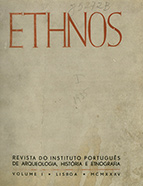

................................
Throughout its eight issues, ethnographic articles followed a similar pattern, focusing on topics such as folk songs, the gastronomy of the Beiras region, regional sweets, and religious traditions, particularly from Alentejo. These articles highlighted regional peculiarities while emphasising the deep-rooted essence of Portuguese identity. Historical articles, though less frequent within the journal's overall content, rarely ventured outside the 15th to 18th centuries, with a strong emphasis on the 16th century. These contributions were almost invariably consistent with the ideology of the Estado Novo regime. Although a distinct endeavour, the subject matter and treatment of information in the journal align with works such as the Monumenta Henricina , edited by Manuel Lopes de Almeida, Idalino Ferreira da Costa Brochado, and António Joaquim Dias Dinis O.F.M., and Descobrimentos Portugueses [The Portuguese Discoveries] by Silva Marques, a former contributor to Ethnos , as previously mentioned.
From the fortress of Malacca to the (symptomatically chosen) defeat of Nassau in the Bay of All Saints, from accounts of unpublished journeys across various parts of the Empire to the chancellery of King Manuel, from the cartography of the Discoveries to Gil Vicente, Prince Henry the Navigator, and even the hotly debated leitmotiv of the causes of Portuguese expansion into the Maghreb—the journal presented a wide array of themes. Discussions often centred on revisiting the Serbian theses regarding tensions between the bourgeoisie and nobility, alongside the revival of the Crusade ideal as the driving force behind the Ceuta enterprise. Throughout these explorations, the Portuguese Expansion emerges as a dominant theme, consolidating the narrative that the Empire was Portugal’s historical destiny. Prince Henry is consistently depicted as the guiding figure—visionary, transcendental, and the first to fulfil this grand and patriotic design. This was achieved without neglecting historiographical rigour, particularly in the transcription and analysis of primary documents.
This work is financed by national funds through FCT - Foundation for Science and Technology, I.P, in the scope of the projects UIDB/04311/2020 and UIDP/04311/2020.
